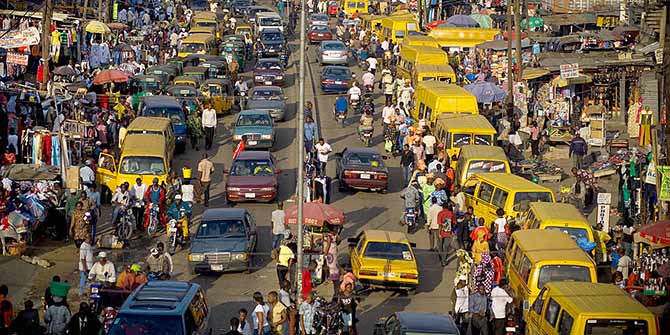As discussed by the African public intellectual Professor Pius Adesanmi in a recent LSE public lecture, LSE’s Mitchell Aghatise wonders when the Nigerian populace will fully exercise their power for democracy.
To the non-Nigerian, the Nigerian factor defies explanation – it must be experienced. This factor bears the brunt of blame for almost everything that goes wrong in the country. Sometimes it is unfair. Simple issues that should be resolved easily are instead heaped on this factor, conferring on it unrivalled notoriety. The Nigerian factor can be seen in a poem by John Pepper Clark “… Here, nothing works.”
Coming from this background, Professor Pius Adesanmi, in his recent lecture at LSE, finds it safe to assume that the 2015 elections will not escape the Nigerian factor. Drawing on the Nigerian authors of old, who have at different times in history, sounded a note of warning to which almost no-one ever listens. One such book, A Man of the People by Chinua Achebe, was almost vivid in his prophesy of the 1966 coup. If we continue to ignore authors who now criticise cracks in the system, it will mean uncertainty for our fledgling democracy. Conferring the status of the mystic Cassandra on these warnings is not in our best interest.
The “Nigerian factor” in the title of Professor Adesanmi’s lecture refers to a troubling attitude among Nigerian people. This is the self-deprecating jokes which are a favourite pastime in the country. Instead of engaging with social issues, we use these as inspiration to create jokes – despite becoming angry when the jests come from a foreign source.
At this juncture, I will respectfully disagree with Professor Adesanmi’s views on self-deprecation. In my opinion as a Nigerian and one who has experienced life in the West African country, the jokes and the tone of the delivery is instead our way of maintaining our sanity; not an implicit recognition or acceptance of the state of affairs. I once came across a mural in Lagos, with the splattered words, “Welcome to hell”. With humour and a light-hearted approach, life becomes much more bearable navigating the figurative hell of Lagos. Despite my misgivings, I must concede that to move our democracy forward, there must be concerted discussions to ensure we unshackle ourselves from this bondage – the Nigerian factor.
Professor Adesanmi’s ideas have shifted focus from blaming only the leadership for our issues to redefining the psyche of the masses. We must ask, what is acceptable? We must make known what we will not tolerate. This is important, in his view, because the leadership in Nigeria is a lost cause but can only be held to account when the people, the followers, rid themselves of the herd mentality. One begins to side with the view that the followers get the leaders they deserve, when we see the docility that often spots our electorate.
The democracy we seek for the Nigerian people can only be demanded by them. He laments that on 4 December 2014 (the date of his LSE public lecture), just two months before the general elections, it was unclear who the Presidential candidates were going to be. He sometimes wonders if these are the same masses who engineered the Occupy Nigeria protests.
How can we stand for and tolerate the content of our institutions, the blatant lack of dignity and respect we are afforded as a people? Pius finds it insulting that we have made ourselves so docile. Such is the extent that a sitting President could shun Presidential debates, safe in the knowledge that votes will be secured by sharing party-branded lollipops.
Indeed, this is where the crux of the matter lies. The 2015 election and, dare I say, our democracy will be bedevilled by this Nigerian factor. Once the people begin to demand accountability, and become wiser in their views – then, the Nigerian factor would have lasted its course in our democracy.
During the lecture, Pius reflected that, if the APC truly wants to be a genuine alternative to the ruling PDP party, they should start by ensuring respect and dignity to their supporters. The APC presidential primaries, held on 10 December 2014, were conducted in a manner that earned plaudits both far and wide. It has been adjudged in all quarters as a step in the right direction, unencumbered by the usual symptoms of the Nigerian factor. This is indeed gratifying news. Also gratifying was that this election was not won by the candidate with the most dollars to share (or bags of rice for that matter). This is good news, but not enough to celebrate. But, if this is an indication that the curse of Cassandra has been lifted and the people are willing to demand leadership, then, come February 2015, we may have cause to celebrate.
In the meantime, we wait.
Mitchell Aghatise is a postgraduate student at LSE.
The views expressed in this post are those of the author and in no way reflect those of the Africa at LSE blog or the London School of Economics and Political Science.






1 Comments